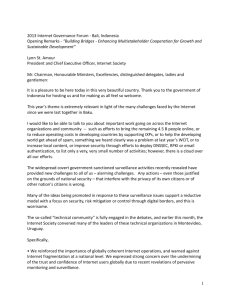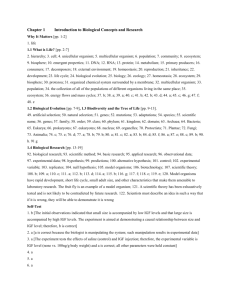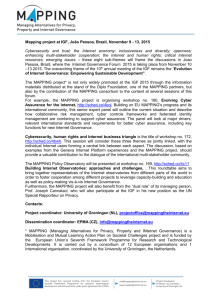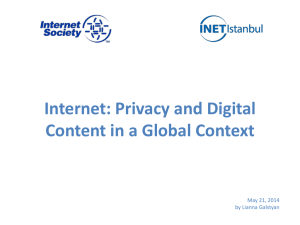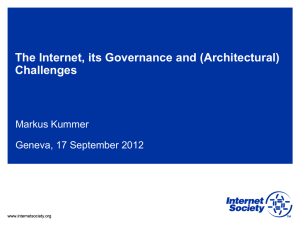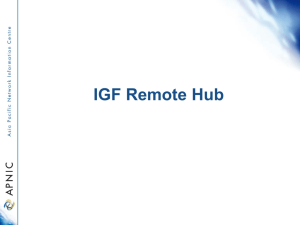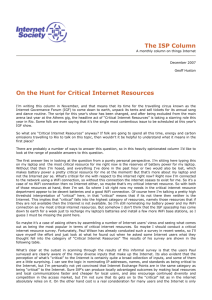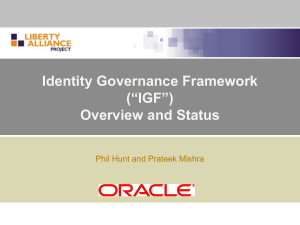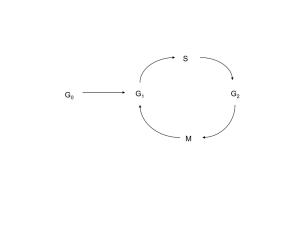The information solicited through this questionnaire will only be used in aggregate form,
advertisement
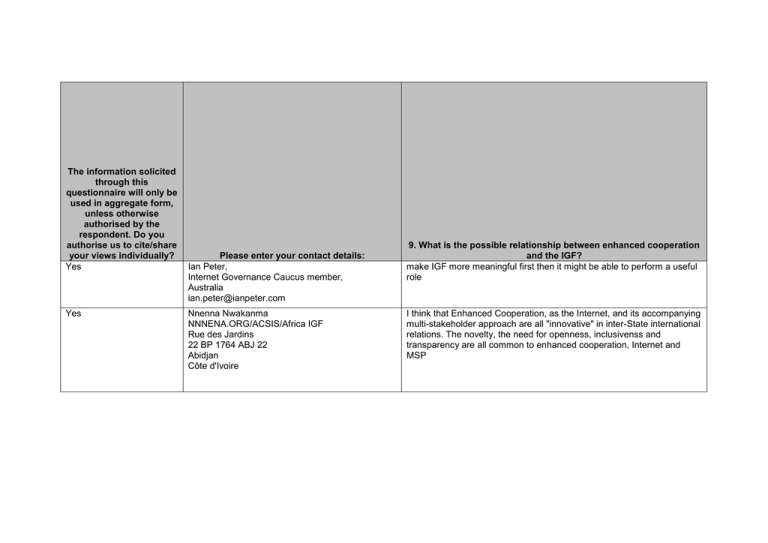
The information solicited through this questionnaire will only be used in aggregate form, unless otherwise authorised by the respondent. Do you authorise us to cite/share your views individually? Yes Yes Please enter your contact details: Ian Peter, Internet Governance Caucus member, Australia ian.peter@ianpeter.com Nnenna Nwakanma NNNENA.ORG/ACSIS/Africa IGF Rue des Jardins 22 BP 1764 ABJ 22 Abidjan Côte d'Ivoire 9. What is the possible relationship between enhanced cooperation and the IGF? make IGF more meaningful first then it might be able to perform a useful role I think that Enhanced Cooperation, as the Internet, and its accompanying multi-stakeholder approach are all "innovative" in inter-State international relations. The novelty, the need for openness, inclusivenss and transparency are all common to enhanced cooperation, Internet and MSP Yes Country: DEMOCRATIC REPUBLIC OF CONGO Organization: CENTRE AFRICAIN D'ECHANGE CULTUREL Il y a même une forte complicité entre la coopération renforcée et l’IGF. L’IGF rassemble une mosaïque d’acteurs provenant de toutes les institutions et de tous les continents. C’est même le cadre approprié de la coopération renforcée. Adress: CAMPUS NUMERIQUE FRANCOPHONE DE KINSHASA.44, AVENUE DE L'HOPITAL email: cafec3m@yahoo.fr/b.schombe@gmail.com Yes Russia, Coordination Center for Russian Top-Level Domains, 8, Zoologicheskaya Str., Moscow, 123242, Russia; info@cctld.ru Yes Sweden, Netnod, Franzéngatan 5, 112 51 Stockholm, info@netnod.se Yes Bangladesh The Forum for Development, Journalism and Communication Studies (FOCUS) focus_bangladesh@yahoo.com With reference to para. 8, that may further promote and solidify the relationship between enhanced cooperation and the IGF as mutually complementary activities, each taking stock of each other and propelling each other’s advancement on the conceptual and organizational levels, allowing, at the same time, periodical reviews of respective activities underway. The exchange of knowledge makes the chance higher that decisions later made by each stakeholder group end up being a more informed decision. NA Yes Russia Russian Association for Electronic Communications Presnenskaya embankment, 12, Federation Tower West, floor 46, Moscow, 123100 www.raec.ru info@raec.ru With reference to para. 8, that may further promote and solidify the relationship between enhanced cooperation and the IGF as mutually complementary activities, each taking stock of each other and propelling each other’s advancement on the conceptual and organizational levels, allowing, at the same time, periodical reviews of respective activities underway. Yes Country: United States Organization: Internet Governance Project Address: Syracuse University School of Information Studies Syracuse, NY 13244 USA E-mail: press@internetgovernance.org Yes Internet Corporation for Assigned Names and Numbers Los Angeles, CA, USA 12025 Waterfront Drive, Suite 300 Los Angeles, CA 90094-2536 USA Phone: +1 310 301 5800 FAX: +1 310 823 8649 baher.esmat@icann.org It was a tremendous mistake for the Tunis Agenda to define enhanced cooperation and the roles of various stakeholders in a way that privileged governments and excluded business and civil society. This meant that from the beginning, the IGF could not play a major role in formulating global public policy principles, because the IGF is based on equal-status discussions. Another barrier to IGF involvement was the fear that many status quo advocates had of allowing the IGF to make recommendations. This prevented representatives of different viewpoints from really engaging with each other and seeking common ground or points of consensus. Thus, using the IGF to enhance cooperation requires two major changes in the Internet governance environment: 1) abandoning the Tunis Agenda’s definition of stakeholder roles, and 2) allowing the IGF to make recommendations. Although the IGF and the process towards enhanced cooperation can be seen as two separate outcomes of the WSIS process, the IGF has served as a platform for enhanced cooperation. It has been effective in bringing all stakeholders (including governments) together to engage openly and freely in discussions around various Internet governance issues. It has also facilitated the cross-pollination of ideas, and stimulated cooperation among various stakeholder groups. The last few years have witnessed many multi-stakeholder initiatives, not the least of which is the spawning of national and regional IGFs. At ICANN, we recall that the first dialogue with UNESCO on fostering cooperation between our two organizations took place at the second IGF meeting in Rio de Janeiro in 2007. The IGF should continue its role as an open process for stimulating and enhancing cooperation among all stakeholders. South-South Opportunity jrtnchekoua@gmail.com B.P 33 Yaoundé Cameroon" Yes Yes USA American Registry for Internet Numbers (ARIN) 3635 Concorde Parkway, Suite 200 Chantilly, Virginia, 20151 chandley@arin.net This progress is not to avoid all the emergence of a "digital divide" within the French population, as highlighted several reports. Along with a proactive policy to promote the Internet, governments implement policies to control the one hand, to protect copyrights, and secondly, to guarantee individual freedoms and respect for private data. ARIN sees the IGF as the catalyst for enhanced cooperation. The IGF venue allows for information-sharing and open discussion between all stakeholders. The non-decisional status of the IGF permits an open exchange of ideas, views and concerns that otherwise may not be possible. Everyone is welcome to the IGF regardless of roles and responsibilities, yet at the same time, all stakeholders’ roles and responsibilities are respected and taken into consideration during discussions. Yes Country: JAPAN Organization: Japan Network Information Center (JPNIC) Address: 4F Urbannet Kanda bldg. 3-6-2 Uchi-Kanda, Chiyoda-ku Tokyo 1010047 JAPAN Email: secretariat@nic.ad.jp We appreciate that IGF is the core process for the promotion of enhanced cooperation, which successfully gathers a lot of governments as well as various Internet stakeholders to enable active dialogues on an equal footing among them. We would like the IGF to be more activated as the promotion body of enhanced cooperation. Yes Country:Japan Organization:KEIDANREN Address:1-3-2,OTEMACHI CHIYODA-KU,TOKYO 100-8188 E-mail:joho@keidanren.or.jp As a venue for focused discussions by a small group carefully selected from each region, the WGEC should not superficially discuss all items to be addressed at the IGF; rather, its aim should be to achieve highly effective outputs after in-depth discussion of specific items. The IGF’s role should be to build a broader consensus based on that. Yes Country: Japan Organization: Japan Registry Services Co., Ltd. Address: CFB East 13F, 3-8-1 Nishi-Kanda, Chiyoda-ku, Tokyo 101-0065 JAPAN E-mail: hotta@jprs.co.jp As mentioned before, various multistakeholders including governments participate in the IGF and discuss international public policy issues pertaining to the Internet. IGF framework should be further utilized at a maximum as a forum to discuss and yield a concept or specific idea of promoting enhanced cooperation. Yes Government Offices of Sweden Ministry for Foreign Affairs Department for International Law, Human Rights and Treaty Law Carl Fredrik Wettermark SE-103 39 Stockholm Sweden carl-fredrik.wettermark@gov.se The IGF provides a platform for dialogue between all stakeholders, including between governments, and, is a good example of how efficient enhanced cooperation is taking place, and is a well suited platform to more effectively facilitate interaction and synergies between the forums and organisations that constitute the Internet governance landscape. Yes United States, Imagining the Internet, CB 2850, Elon University, 27244, andersj@elon.edu no time Yes Igor Milashevskiy, i.milashevskiy@minsvyaz.ru Alexander Grishchenko, a.grichenko@minsvyaz.ru Russian Federation Ministry of Telecom and Mass Communications (Mincomsvyaz of Russia) 7, Tverskaya str., Moscow, 125375, Russian Federation Email: office@minsvy Yes RIPE NCC Singel 258 1016AB Amsterdam The Netherlands Email: externalrelations@ripe.net The Internet Governance Forum is an open platform for participation of all organizations involved in the multilateral process of Internet governance. The mandate and function of the Forum are specified by provisions 72, 73 and 77 of the Tunis Agenda. Taking into account that the Forum is not responsible for elaboration and adoption of policies, but gives all parties an opportunity to exchange the best practices, experience, to raise topics for further development of the Internet, the Forum would elaborate consolidated views or recommendations. As noted in our response to the previous question, the RIPE NCC sees the IGF as the key organ for furthering enhanced cooperation. While subject to ongoing improvements and evolution, the IGF is defined by its status as a non-decision making, information-sharing body. Its importance stems from the opportunities it provides for all Internet stakeholders to come together to discuss governance issues and attempt to find common ground and understanding. We understand enhanced cooperation to include the broad range of models and strategies that exist (and that are yet to emerge) for better reflecting the multi-stakeholder nature of the Internet in policy-making, thereby fostering the creation of better policy. The IGF and its national and regional counterparts facilitate the development of these models and strategies through workshops, main room discussions, dynamic coalitions and corridor discussions. Given the urgent need to address the many policy challenges presented by the Internet's rapid growth, the IGF is important both as a venue to develop new policy-development approaches, but also to share and adapt those approaches for application in an expanding range of scenarios. Yes Ellen Blackler Vice President, Global Public Policy The Walt Disney Company 425 Third Street, Suite 1100 Washington DC 20024 United States The IGF is an example of a successful forum for enhanced cooperation. The IGF serves as a critical forum for thought leaders in the Internet community to work towards greater understanding and consensus building. At the same time, it encourages new voices and new ideas to join the dialogue, in particular those from emerging and developing countries, thereby expanding participation in the cooperative model. Yes Mark Carvell Head, Global Internet Governance Policy Creative Economy, Internet and International Department for Culture, Media & Sport 100 Parliament Street London SW1A 2BQ United Kingdom mark.carvell@culture.gsi.gov.uk The IGF has played an unprecedented and major role in bringing together, in a single global forum, stakeholders across the entire range of public policy interests pertaining to the Internet. Furthermore, this model of open and inclusive interaction on an equal basis has been replicated at the national and regional level. Each year sees new national and regional multi-stakeholder fora emerge. Inevitably the scale of this interaction of shared interests and expertise, benefitting from the focus provided by IGF workshops and open fora that also open the door to new potential partners, leads to active cooperation, coalitions and scaled up cooperative action. The global IGF and the cooperative initiatives, including those that involve governments, that have emerged since 2005 are often linked in this way: the IGF as a global meeting place for 2000+ stakeholders and a forum for dialogue, has also provided the trigger, or acted as a catalyst, for action. Yes ORGANISATIONAL ENDORSEMENTS: Association for Progressive Communications (APC) Global Valeria Betancourt <valeriab@apc.org> Bytes for All, Pakistan Pakistan Shahzad Ahmad <shahzad@bytesforall.pk> Centre for Community Informatics Research. Development an Yes Malaysia Consumers International Lot 5-1 Wisma WIM, Jalan Wan Kadir 3, Taman Tun Dr Ismail, WP 60000, Malaysia jeremy@ciroap.org The IGF complements the enhanced cooperation mandate, but as it stands, it does not fulfill that mandate. Some of us believe there is the potential for a significantly strengthened IGF, with appropriate long-term funding support, to host a new framework or mechanism to facilitate the development of globally-applicable principles on public policy issues through a multi-stakeholder process. If so, this would have be entirely new and supplementary to the IGF’s existing structures and processes, significantly differing from those that exist now such as the MAG, workshops and dynamic coalitions. In any case, regardless of whether any such new framework or mechanism is part of the IGF, the IGF’s existing structures and processes will be valuable in deepening the public sphere for multi-stakeholder discussion of Internet policy issues, which will be integral to the work conducted through the new We associate ourselves with the Best Bits submission, except for the additional answer to question 8 above. Yes Country: Switzerland Organization: Digitale Gesellschaft Schweiz Address: Digitale Gesellschaft, c/o Swiss Privacy Foundation, CH-5620 Bremgarten AG E-mail: office (at) digitale-gesellschaft.ch The IGF is about open discussion, enhanced cooperation is about taking action. Yes (a young international NGO with seat in Switzerland) Organization: GodlyGlobal.org Address: GodlyGlobal.org c/o Norbert Bollow, Weidlistrasse 18, CH-8624 Grüt Email: nb@GodlyGlobal.org The work of the institutions implementing the Tunis Agenda's enhanced cooperation mandate must be made completely transparent to the IGF community, and subject to discussion at the IGF in particular in the context of workshops. The corresponding output documents as per the recommendations of the WG on Improvements to the IGF should in turn be taken in consideration as input documents by the institutions implementing the enhanced cooperation mandate. Yes Anja Kovacs, Project Director Internet Democracy Project C14E Munirka DDA Flats New Delhi 110067 India anja@internetdemocracy.in While we believe that it would be detrimental for global Internet governance to have one body that leads all efforts at international Internet public policy making, we also believe that it is important to have a venue where ongoing and future processes and their outcomes are presented to and discussed with a wider audience, and where those who want to start a new initiative easily find a wide range of actors to share their ideas with and explore the possibility of taking their initiative forward. As it already brings together the widest range of actors in the Internet governance space, the IGF is ideally suited to fulfil this role of clearing house. At the same time, having such a role would also aid to sharpen the mandate of the IGF itself, and ensure that its contribution to Internet governance would significantly increase as foreseen by the Working Group on IGF Improvements. The inclusion of structured feedback processes on ongoing issue-specific Internet governance processes in this restructured IGF is essential, as it will guarantee that a wider audience can voice its opinions on proposals as they are being evolved. Some of the proposals of the Working Group on IGF Improvements provide a helpful starting point for thinking on how to channel such feedback in an organised manner at the IGF in practice. If the IGF is accorded this function, it is likely to lead to a more specific agenda for the Forum and a greater perceived relevance among a range of actors. Accordingly, while a core group of participants will likely to continue to attend the Forum on a yearly basis, a considerable segment of participants will likely shift from year to year, depending on their own expertise and the central issues that are discussed at that time. In the long term, Internet governance will benefit from such an enlarged, even if shifting, Internet governance community, as it will further ensure that it can draw on a great range of expertise. Yes Country: India Organization: SFLC.IN Address: 2nd Floor, K-9, Birbal Road, Jangpura Extension, New Delhi -110 014, India. E-mail : mishi@softwarefreedom.org Yes LACNIC Latin American and Caribbean Regional Addresses Registry Rambla República de México 6215, Montevideo, Uruguay. comunicaciones@lacnic.net The most important outcome of the WSIS process is the establishment of the Internet Governance Forum, a process for enhanced cooperation. The Tunis Agenda for the Information Society invited the SecretaryGeneral, United Nations to formulate a new forum for multistakeholder policy dialogue, called the IGF and implement this mandate in an open and inclusive process. Enhanced cooperation under article 69 and 71 of the Tunis Agenda speaks of multi stakeholder consultation, including the government and other stakeholders, on issues involving international public policy pertaining to the Internet. IGF as a forum has been a testing ground for enhanced cooperation. The IGF has created a platform enabling interaction between various stakeholder groups. However, there is a need for outcome documents from the IGF to feed into policy initiatives at various international and inter-governmental organisations. This would make IGF more meaningful as a forum that can influence policy dialogues in the international sphere. Noted that the IGF is and should remain the key organ for furthering enhanced cooperation, subject to improvements and evolution that are in fact ongoing, this forum is defined by its status as a non-decision making, information sharing body. Its importance stems from the opportunities it provides for all Internet stakeholders to come together to discuss governance issues and attempt to find common ground and understanding. The IGF and, especially, the regional and national processes will facilitate the development of these models and strategies through workshops, main room discussions, dynamic coalitions and corridor discussions. The improvement of all those national and regional discussions would contribute to creating an environment that facilitates this development of public policy principles, as is established by paragraph 70 of the Tunis Agenda. Yes United States Center for Democracy & Technology 1634 I Street NW #1100 Washington, DC 20006 mshears@cdt.org Certainly, the issue of enhanced cooperation has been the subject of numerous discussions at the IGF, whether in workshop, plenary or preevent form. And there is merit to the proposal of the IGF being a locus for the realization of enhanced cooperation, and its further deliberation. There are those actors who see the IGF and enhanced cooperation as two distinct mechanisms. While the IGF may not satisfy some due to its lack of oversight and non-binding processes, it could become a clearing house of sorts for assessing whether or not international public policy issues should be the subject of further cooperation between stakeholders. CDT fully supports the IGF and its evolution into a more output-oriented forum in which all stakeholders will feel comfortable discussing international Internet-related public policy issues. To do so will, however, require further participation from governments and from stakeholder representatives from developing countries, along with the resolution of a range of organizational and funding related challenges. We would note that all stakeholders were asked to “acknowledge the importance of and renew their commitment to the Internet Governance Forum (IGF)” in the final communiqué of the WSIS+10 review hosted by UNESCO early 2013. Given recent funding challenges now would be good time for stakeholders and particularly governments to do so. Yes Yes We consider the IGF to be one institution where enhanced cooperation is being operationalized, but which does not in itself fully implement enhanced cooperation. In fact, the IGF may be the one institution that has fully embraced the culture of multistakeholderism discussed in the response to question 3, as it is open to all interested parties, transparent in its decisionmaking processes, respectful of the equal participation of all stakeholder groups, bottom up in engaging those directly affected, diverse and multilingual; and builds capacity for actors and stakeholders to meaningfully participate. Of course, the IGF has a number of institutional shortcomings, which we do not need to reiterate here. Brazil Center for Technology and Society of Fundação Getulio Vargas Praia de Botafogo, 190, 13 andar Rio de Janeiro - RJ joana.varon@fgv.br marilia.maciel@fgv.br The IGF could contribute further to enhanced cooperation in a few different ways. First, since governments are in fact on equal footing at the IGF (both with each other and with other stakeholders) the IGF could deepen enhanced cooperation if more governments participated at a higher level, which would be more likely if the proceedings at the IGF translated into or contributed more directly to concrete policy decisions. Second, since we view strengthening linkages between different institutions as an important aspect of enhanced cooperation, connecting proceedings/discussions at the IGF to other decision-making bodies could help in this respect. Third, being a relatively new institution and one that has not yet fully matured, the IGF can provide important insight into the challenges of creating new institutions. The IGF should be recognized as the main space for agenda setting in the Internet governance regime, where the emerging issues and policy gaps are identified. The outcomes of IGF discussions, in the format of policy options (following the recommendations of the WG on IGF improvements) should be the starting point for further discussion in an enhanced cooperation mechanism. When outcomes are forwarded from the IGF, an EC liaison person should be responsible to bring these outcomes to the attention of the EC members. The EC mechanism should remain accountable to the IGF community by providing detailed information about the status of the discussions to MAG and during the IGF. Yes Japan, Ministry of Internal Affairs and Communications Kasumigaseki 2-1-2, Chiyoda-ku, Tokyo 100-8926, JAPAN m3.ichikawa@soumu.go.jp The IGF is a place where multi-stakeholders participate and extensively discuss international public policy issues pertaining to the Internet. Therefore, it is important to continue making effective use of the IGF for the implementation of enhanced cooperation. Yes Cote d’Ivoire, DIGILEXIS – SPR, 28 BP 1485 Abidjan 28 kichango@gmail.com The IGF complements the enhanced cooperation mandate, but as it stands, it does not fulfill that mandate. The IGF however could be the perfect readily available space for furthering and feeding into enhanced cooperation mechanisms and processes around ICTs at the most global level. For instance we mentioned above that based on the genesis of the notion, enhanced cooperation would begin to apply more significantly among governments as a stakeholder group, but it would then need to scale up to a full multi-stakeholder level where governments will coexist with the other stakeholder groups. Once EC is successfully implemented to define and institutionalize the working relationships between all stakeholder groups, IGF will become the natural yearly gathering where the full bodies and mechanisms defined through EC will come together with the public and Internet users at large in order to report, to engage, to listen to the concerns of the public and pay attention to the current and emerging issues facing the broader internet community. Ideally, a process should be put in place for the relevant EC structure in place to collect a minimum number of the most pressing issues which it will commit to putting on its agenda for the next cycle and to reporting back on progress at the next IGF. In this scenario, IGF will need to be significantly strengthened, with appropriate long-term funding support, to host the new framework or mechanism resulting from all-stakeholder enhanced cooperation, in its effort to facilitate the development of globally-applicable principles on public policy issues through a multi-stakeholder process. IGF would be the largest embodiment of the global public sphere around internet policy issues and the largest marketplace for related ideas. The strengthened IGF will be set up in a way that there will always be outcomes, whether as propositions or recommendations, for the newly EC-enabled frameworks or mechanisms to take away and form the basis or the pool for their next sessions’ agenda items. Yes France, INTLNET, 120 chemin des Crouzettes, Saint-Vincent de Barbeyrargues, France 34730, info@intlnet.org As far as I understand, the IGF is where dynamic coalitions advising enhanced cooperations cross-pollinate. When considering the role it should play, it should be renamed the “intergovernance forum of the information society”. Yes Saudi Arabia, Communications and Information Technology Commission (CITC) PO Box 75606, Riyadh 11588, Saudi Arabia MAJED ALMAZYED, mmazyed@citc.gov.sa Enhanced cooperation and the IGF have been recognized by CSTD, ECOSOC and UNGA as two distinct processes which may be complementary. The response to Q6 indicates that a methodology is needed for inputs and multistakeholder collaboration on public policy development leveraging existing forums, organizations and processes. Certainly, the IGF is an example of an existing forum which could be leveraged for such purposes. The various enhanced cooperation committees might sponsor IGF discussion (both regional and global) on their particular policy issues and/or the IGF meeting chairs might summarize multistakeholder input in their reports. Yes United States of America Notwithstanding the Information and communications technologies for development Resolution 67/195 from the United Nations regarding the relationship between enhanced cooperation and the Internet Governance Forum, the IGF is, in fact, one of the best examples of enhanced cooperation effected since Tunis. The IGF also warrants this status because it fosters enhanced multistakeholder cooperation, not only in the proceedings of its annual, global forum, but also in the planning and preparation for that forum over the course of the intervening year, including its consultative processes and its incorporation of the regional and national initiatives that occur between the annual IGF. In short, the United States believes that the IGF is the epitome of the multi-stakeholder processes that have made the Internet an engine of economic growth, innovation, and empowerment of individual citizens around the world. The IGF provides the premier and regular opportunity for governments, industry, civil society, and the technical community to address Internet issues in a broad, creative, and collaborative manner. The CSTD’s Working Group on Improvements to the IGF made excellent recommendations for improving the IGF, including increasing participation in the IGF, capturing the outputs from the proceedings, etc., and we look forward to working with the international community to implement those recommendations. Yes United States, Intel, 12 Poet Drive, Matawan NJ, 07747, Mike.s.chartier@intel.com Created in Tunis, the Internet Governance Forum plays a central and crucial role as the vehicle for bringing together all parties for an open discussion of policy issues. Intel agrees with the Report of the Secretary General that “The institutional framework resulting from WSIS outcome documents has made a valuable contribution to their implementation. Multi-stakeholder collaboration in the IGF has deepened the understanding of technical and policy issues relating to the Internet.” Intel increased its support of IGF in 2013 and we appreciate and support the ongoing dialog to improve its functioning including the recommendations of the CSTD Working Group on Improvements to the Internet Governance Forum, and we support calls from the internet community including Vint Cerf for strengthening and improving it . Yes Kenya ICT Action Network (KICTANet) www.kictanet.or.ke, and the Internet Society (ISOC) Kenya Chapter http://isoc.or.ke/ It is confusingly similar since IGF is a policy discussion space that brings together stakeholders while enhanced cooperation will involve governments, in consultation with other stakeholders in development of policy issues. If enhanced cooperation will lead to binding policies that can be implemented, then it is very different from the Igf. Enhanced cooperation and the IGF are both a result of the WSIS 2005 which intern was a result of a working group on internet governance WGIG from 2003. Enhanced cooperation is a process that integrates into IG and development. Despite the fact that enhanced cooperation and the IGF are non decision making processes, they enable a neutral space for discussion of policies from different stakeholders without the fear of condemnation be it governments, civil society, private sector, human rights groups etc. Therefore enhanced cooperation is a process that in the end integrates to internet governance forum. Contacts: Mwenda Kivuva (Kivuva@transworldafrica.com) Meshack Emakunat (memakunat@yahoo.com) Grace Githaiga (ggithaiga@hotmail.com (M Yes Switzerland, Federal Office of Communications OFCOM, 44 rue de l’Avenir, CH-2501 Biel/Bienne, Switzerland ir@bakom.admin.ch The IGF as a platform open to all interested stakeholder to discuss public policy issues related is a unique forum for fostering enhanced cooperation between all stakeholders. The potential of the IGF should be fully used to enhance cooperation between all stakeholders. Yes Finland, Government and other parties include the multi-stakeholder WSIS working group which acts also as steering committee for the Finnish Internet Forum Mervi.Kultamaa@FORMIN.FI IGF was successfully implemented from 2006 on, while the process towards enhanced cooperation remained stalled. Thus, IGF from the very beginning became a key locus for EC among stakeholders on a global level, reinforced by the development of regional and national IGF’s. As a multi-level, round-the-year process that IGF has become, it is the best living example of successful EC. Yes France, International Chamber of Commerce (ICC), 38 Cours Albert 1er 75008 Paris, aha@iccwbo.org The IGF each year and through its preparatory open consultations and MAG (Multistakeholder Advisory Group) meetings has catalysed enhanced cooperation. The IGF is an example of enhanced cooperation given the many illustrations we see each year of the IGF assisting in the achievement of the purpose and objectives listed in our response to question 2. There are numerous examples of enhanced cooperation that have emerged out of the IGF, and out of multiple other forums. The IGF brings together stakeholders in workshops, sessions and open forums, catalyzes partnerships in a multistakeholder manner among participants, and reinforces the improved cooperation and coordination among respective areas of expertise. The IGF national and regional initiatives have also contributed to enhancing cooperation. Yes Czech Republic, Ministry of Industry and Trade of the Czech Republic, Na Frantisku 32, 110 15 Prague 1, novakovam@mpo.cz Dialogue, experience and information exchange Yes Russian Federation, The council of the Federation of the Federal Assembly of the Russian Federation (the Upper Chamber)103426, Moscow, Bolshaya Dmitrovka str., 26 rugattarov@council.gov.ru Forum on Internet Governance has established itself as an effective expert platform. In this regard, the platform can be used to generate proposals regarding to specific areas, forms, and other constituent documents of international cooperation. Also they can be used as public area for official representatives of different countries, whose participation in the certain event are usually at high level and beyond the reach of civil organizations. Yes Mexico 1) Camara Nacional de las Industria Electronica de telecomunicaciones y tecnologias de la informacion (CANIETI) Culiácan No. 71 col. Hipodromo Condesa México D.F. INDAUTOR: La posible relación entre la cooperación reforzada y el Foro para la Gobernanza de Internet sería la gestión internacional de internet, ya que de acuerdo con la Agenda de Túnez la gestión de internet debería garantizar una distribución equitativa de los recursos, facilitar el acceso de todos y garantizar un funcionamiento estable y seguro de internet. 2) Instituto Nacional del Derecho de Autor (INDAUTOR), Puebla #143, Colonia Roma CANIETI: Si se le da transparencia y equidad al IGF, puede ser el punto de reunión de las mejores prácticas de gobernanza y de operación de políticas públicas Yes United States of America, United States Council for International Business (USCIB), 1400 K Street, NW, Suite 905, Washington, DC 20005 bwanner@uscib.org The IGF serves as a shining example of enhanced cooperation given the many illustrations we see each year – particularly coming from IGF workshops -- of how the IGF has assisted in the achievement of the purpose and objectives listed in our response to question 2. By bringing together stakeholders in workshops, sessions and open forums, the IGF has catalyzed partnerships in a multistakeholder manner among participants, and reinforced cooperation and coordination among respective areas of expertise. For example: Through a series of IGF workshops beginning in 2006, the cooperative work of UNESCO and ICANN on multilingualism has evolved, eventually resulting in the conclusion in December 2009 of an MOU aimed at supporting the introduction of top-level Internationalized Domain Names (IDN), particularly in the developing world; -At the 2010 IGF, UNESCO and ICANN signed a letter of intent aimed at assisting Internet users’ access in Member States whose official languages are based on the Cyrillic script; and -A workshop planned for the Bali IGF will feature a discussion involving an expert who worked closely with the government of Porto, Portugal. He will elaborate on Porto’s experience in building an ecosystem where universities, municipalities, large corporations, SMEs, and end-user communities can come together to develop future Internet technologies and cloud-based services that leverage big data to improve the quality of life, safety, and environmental sustainability in modern cities. The Porto case study not only illustrates the economic and societal benefit of enhanced cooperation in urban planning, but serves as a “how-to” model and opportunity for IGF participant follow up in their home countries. Yes 43 civil society organizations, 10 of them with ECOSOC consultive status, and many more individuals. Organizations supporting the proposal: 1. Action Aid International (ECOSOC status) 2. Bangladesh NGOs Network for Radio and Communication, Bangladesh (EC The UN Internet Governance Forum (IGF) was established as a multistakeholder 'policy dialogue forum' by the World Summit on the Information Society. The proposed global Internet policy mechanism, especially the new UN based body, will maintain a close relationship with the IGF. IGF affords a very new kind of participative mechanism for policy making, whereby the participation realm is institutionalized, and relatively independent of the policy making structures. The IGF should preferably pre-discuss issues that are taken up by this new policy body and present diverse perspectives for its consideration. A good part of the agenda for this new body can emerge from the IGF. Whenever possible, draft proposals to be adopted by this new body should be shared with the IGF. To perform such a participation enhancing role, the IGF must be adequately strengthened and reformed, especially to address the dominance of Northern corporatist interests in its current working. It must be supported with public funds, and insulated from any funding system that can bring in perverse influences on its agenda and outcomes. Other required processes must also be put in place to ensure that the IGF indeed brings in constituencies that are typically under-represented, rather than provide further political clout to the already dominant. A participative body is only as good as the policy making mechanisms that feed off it. To that extent, the meaningfulness and effectiveness of the IGF itself requires a strong policy development mechanism, as suggested in this document, to be linked to it. Investing in the IGF is useful only if its outputs and contributions lead to something concrete. Funding An innovative way to fund the proposed new global Internet policy mechanisms, and also the IGF, is to tap into the collections made by the relevant bodies from allocation of names and numbers resources pertaining to the global Internet (like the fee that ICANN collects annually from each domain name owner). These accruals now run into millions of dollars every year and could be adequate to fund a large part of the needed mechanisms for democratic governance of the global Internet. In the end, we may add that there is nothing really very novel in the above proposal for setting up new mechanisms for global governance of the Internet. Similar models, for instance, were proposed in the report of the Working Group on Internet Governance that was set up during the World Summit on the Information Society, back in 2004. We hope that the Working Group on Enhanced Cooperation will fulfill its high mandate to lead the world towards the path of democratic governance of the global commons of the Internet. Yes INDIA, Permanent Mission of India to the United Nations Office 9, RUE DU VALAIS, 1202, GENEVA Mission.india@ties.itu.int The IGF is a forum for multi-stakeholder dialogue. The discussions and dialogue in IGF would enrich the process of development of the international public policy issues pertaining to the Internet by the mechanism proposed under Enhanced Cooperation. Enhanced Cooperation is a mechanism for policy development whereas IGF is a forum for policy dialogue - IGF is, thus, a distinct and a complementary process to the enhanced cooperation mechanism. IGF should contribute its outcomes as inputs into the policy development/ making processes to be undertaken by the new mechanism for Enhanced Cooperation. Yes LATVIA, Ministry of Foreign Affairs, mission.un-gen@mfa.gov.lv IGF is a successful manifestation of enhanced cooperation. The proliferation of IGFs at the regional and national level proves its usefulness and the need for systematic multi-stakeholder engagement. Yes BULGARIA, Law and Internet Foundation, bul. Patriarh Evtimii 36, Sofia 1000, Bulgaria info@netlaw.bg Yes BULGARIA, Department of Administration Modernization, Council of Ministers, 1 Dondukov Blvd.1594 Sofia is.ivanov@government.bg The Tunis Agenda created two tracks – the Internet Governance Forum and a process of ‘Enhanced Cooperation’. It is carefully crafted diplomatic language, full of creative ambiguity. The Secretary General’s report on the consultative process, carried out so far, reflects this well. As Mr. Kummer pointed out, the IGF has turned into a catalyst that enhances cooperation among all stakeholders involved in Internet governance. This process has proved extremely valuable and has triggered off many IGF-type national and regional initiatives, in all parts of the world. Strengthening the IGF would, therefore, also strengthen enhanced cooperation. IGF could contribute greatly to prioritizing the enhanced cooperation process. For instance, Internet Society (ISOC) - Bulgaria has proposed that IGF focus its effort, inter alia, on issues like Cybersecurity (par. 31, 39, 42, 45, 57, 58, 68, 72 of the Tunis Agenda), Freedom of choice (par. 49 of the Tunis agenda) and Interconnection Fees and Spam, regarded as particularly important for developing countries. Yes Country: Bulgaria Organization: Information Technology and eGovernance Directorate, Ministry of Transport, Information Technology and Communications Address: Sofia, 9 Dyakon Ignatii Str. E-mail: hhristov@mtitc.government.bg The Tunis Agenda created two tracks – the Internet Governance Forum and a process of ‘Enhanced Cooperation’. It is in fact carefully crafted diplomatic language, full of creative ambiguity. The Secretary General’s report on the consultative process, carried out so far, reflects this well. Cooperation lies at the top in the mechanism for global Internet governance which is multinational, democratic, and transparent using multi stakeholder participation mechanism which is advocated by IGF. Therefore both initiatives should have strong correlative relationship. The Internet Governance Forum (IGF), run by the IGF Secretariat and supported by the United Nations Secretary-General in carrying out the mandate from the World Summit on the Information Society (WSIS) with regard to convening a new forum for multi-stakeholder policy dialogue the Internet Governance Forum (IGF). The enhanced cooperation is the broader and general framework of all ICT related issues so for reaching the global goals they have to be deeply related. A number of governments felt that, while the IGF has become an established and valued mechanism for Internet governance, progress towards enhanced cooperation on international public policy issues pertaining to the Internet has been much more limited. Participants noted the lack of common understanding on enhanced cooperation on international public policy issues pertaining to the Internet. There was much praise for the achievements of the IGF, which was felt to have established a sound basis for multistakeholder dialogue about Internet governance and public policy issues. The IGF has stimulated the exchange of views and ideas about a wide range of Internet issues, including critical Internet resources.The ICANN, the technical community, including ISOC, international NGOs as APC (“cooperation in internet governance implies that all partners should, in their respective roles, work together on an equal footing and with a shared mission”) and the Internet Society have declared the IGF to symbolize institutionally and functionally enhanced cooperation. However, responding to the novel challenges the IGF should improve its methods and procedures to include on an equal footing all existing stakeholders and even go further to reflect the dynamic development in the field by inviting more stakeholders. The IGF should work not only globally but pay particular attention to regional and local IGF fora and establish a stable network. Most welcomed goals could be the adoption by all interested parties the priorities of enhanced cooperation such as the principles of Internet governance and a memorandum of understanding between countries, clear and transparent principles of prioritization of the Internet traffic and harmonization of laws in the field to avoid gaps, duplications and freedom of expression and information abuses. Yes Bulgaria, Executive Agency Electronic Communication Networks and Information Systems. Bulgaria 1000 “Gurko 6” str. mail@esmis.government.bg . Yes Bulgaria, Council of Ministers, Strategic Development and Coordination Directorate 1 Dondukov Blvd 1594 Sofia y.stoyanov@government.bg, l.kamenova@government.bg The possible relationship is manifold: - identifying key issues and helping to find appropriate solutions to them; - identifying possible funding sources; - discussing key policies; - raising awareness; - others. Yes Bulgaria, Bissera Zankova - Media Adviser to the Ministry of Transport, Information Technology and Communications (MTITC) Sofia, 9 Diakon Ignatii Str. bzankova@gmail.com As reported by specialists (Nigel Hickson, former UK government official and now an ICANN employee) “the original meaning of enhanced cooperation had lost significance by now”. The ICANN, the technical community, including ISOC, international NGOs as APC (“cooperation in internet governance implies that all partners should, in their respective roles, work together on an equal footing and with a shared mission”) and the Internet Society have declared the IGF to symbolize institutionally and functionally enhanced cooperation. The IGF should improve its methods and procedures to include on an equal footing all existing stakeholders and even go further to reflect the dynamic development in the field by inviting more stakeholders. The IGF should work not only globally but pay particular attention to regional and local IGF fora and establish a stable network. Most welcomed goals could be the adoption by all interested parties the priorities of enhanced cooperation such as the principles of Internet governance and a memorandum of understanding between countries, clear and transparent principles of prioritization of the Internet traffic and harmonization of laws in the field to avoid gaps, duplications and freedom of expression and information abuses. Besides enhancing the IGF cooperation with other organizations and especially with those putting efforts in the protection of human rights and democracy in the information society such as the Council of Europe for instance, can prove rather fruitful. See Recommendation CM/Rec(2011)8 of the Committee of Ministers to member states on the protection and promotion of the universality, integrity and openness of the Internet at https://wcd.coe.int/ViewDoc.jsp?id=1835707 See APC Enhancing cooperation among stakeholders in internet governance at http://www.apc.org/en/node/14444 See also Council of Europe background paper on net neutrality Yes Bulgaria, Academy of Sciences (IMI-BAS and LTBAS) Sofia 1113, Acad. G. Bonchev Block 8 Director@math.bas.bg, Yoshinov@cc.bas.bg Yes Bulgaria, Sofia University "St. Kl. Ohridski" Faculty of Mathematics and Informatics 5 James Bouchier Blvd. Sofia 1164, Bulgaria krassen@fmi.uni-sofia.bg Yes Bulgaria, Ministry of Economy and Energy 8 Slavyanska str., Sofia 1000, Bulgaria ts.tsankova@mee.government.bg The role of Internet Governance, where all stakeholders take part on an equal footing, is to be a bridge between different stakeholders, combining efforts of the different stakeholders. Important steps are taken by all stakeholders toward seeking to establish a substantial mechanism on global Internet Governance. Cooperation lies at the top in the mechanism for Global Internet Governance which is multinational, democratic, and transparent using multi stakeholder participation mechanism which is advocated by IGF. The possible role of IGF should be: Discuss public policy issues related to Internet governance; analyse and identify problems between bodies dealing with different international public policies regarding the Internet and discuss issues that do not fall within the scope of any existing body; Exchange of information and best practices of the academic, scientific and technical communities; Identify emerging issues, bringing them to the attention of the relevant bodies and making recommendations. Both initiatives should have strong correlative relationship. Internet Governance Forum (IGF), run by the IGF Secretariat and support the United Nations Secretary-General in carrying out the mandate from the World Summit on the Information Society (WSIS) with regard to convening a new forum for multi-stakeholder policy dialogue - the Internet Governance Forum (IGF). The enhanced cooperation is the broader and general framework of all ICT related issues so for reaching the global goals they have to be deeply related. Yes Country: Switzerland Organization: Internet Society Address: Galerie Jean-Malbuisson 15 Email: bommelaer@isoc.org Originally envisioned by the WSIS Tunis Agenda as two seemingly separate tracks, there is a growing recognition that the cooperation gap identified in 2005 was, in part, filled by the establishment of the IGF. Indeed, we now observe an increasing convergence between the two processes (http://www.internetsociety.org/blog/2012/07/internetgovernance-what-enhanced-cooperation) The IGF is a unique space for all stakeholders to meet on an equal footing and to address key Internet policy issues. The preparatory process for each IGF is led by a Multistakeholder Advisory Group (MAG), which includes all stakeholder groups working together. Stakeholders from all regions have the opportunity to share their expertise and convey their concerns. This annual fora has turned into a catalyst that enhances cooperation among all stakeholders involved in Internet governance and that contributes to shape policies and decisions taken in other fora at the regional and global levels. This cooperative framework has proved extremely valuable to develop a common understanding and approach to Internet Governance issues. The many IGF-type national and regional initiatives that have emerged across all regions are a testament of the value of this platform to fill the cooperation needs of the Internet community. In light of the practical value of the IGF in providing a platform for cooperation, both at the global and local levels, strengthening the IGF would therefore also strengthen enhanced cooperation. Yes Division for the Information Society (DI) Ministry of External Relations - Brazil Tel: +55 (61) 2030-6609 - FAX: +55 (61) 20306613 Brazil considers that “enhanced cooperation' and IGF are two distinct processes, both as per the Tunis Agenda wording and (more importantly) in the light of the experience accumulated since 2005. Brazil acknowledges and values the role of IGF, inter alia, as the main “locus” for agenda setting in the existing Internet Governance regime, allowing for in-depth discussion of relevant issues pertaining to the Internet among all interested stakeholders. However, both entities are completely different in nature and purpose. Enhanced cooperation is meant to be a “policy making space” while IGF is a “policy dialogue space”. It can be argued that IGF discussions could provide the basis for further discussions under “enhanced cooperation” and we take note that some parties consider that IGF itself provides a platform for enhanced cooperation. However, it must be recognized that IGF could not – and should not – replace enhanced cooperation as envisaged in Tunis (and as required today in our assessment) since it lacks the “focus-oriented”, purposeful approach that lies at the origin of EC. However, a mutually beneficial relationship between the two should be fostered. IGF should contribute to the policy development/ making processes undertaken under “enhanced cooperation” and the outcomes of enhanced cooperation could serve as the basis for further reflection under the IGF, with a view to continuously improving the working of the overall Internet Governance architecture as a whole.
